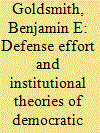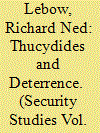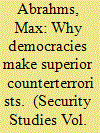| Srl | Item |
| 1 |
ID:
078245


|
|
|
|
|
| Publication |
2007.
|
| Summary/Abstract |
Examining the relationship between regime type and defense effort provides evidence for reformulating theories of democratic peace. Consistent with liberal theories, regime type has substantively and statistically significant effects. In times of peace, democracies bear lower defense burdens than other states and keep proportionately fewer soldiers under arms. During times of war, however, democracies try harder and exert greater defense effort than non-democracies. Contrary to the results of some recent studies, all other things being equal, the arsenal of democracy appears to out-gun its opponents when it counts. Examining three components of democracy separately indicates that a largely overlooked factor, political competition, tends to drive these outcomes. Executive constraints are also associated with increased defense effort during war. But there is little evidence that wide participation or large winning coalitions have the predicted effects on defense effort. The results point to the flexible quality of defense effort in democracies, which is theoretically and empirically accounted for by the competitive political environment rather than institutional factors favored by existing theories
|
|
|
|
|
|
|
|
|
|
|
|
|
|
|
|
| 2 |
ID:
078248


|
|
|
|
|
| Publication |
2007.
|
| Summary/Abstract |
The reputation debate in international relations has split into two camps: those suggesting actions affect perceptions of resolve and those who say they do not. This article engages the reputation debate in the context of militant Islamists. Using political psychology, we offer a theory of biased attributions that challenges Mercer's "desires" hypothesis that reputations for irresolution do not form when an act is desirable from the perceiver's eye. Motivated biases undercut any reputation for resolve in cases of firmness and challenge rationalist claims of reputation formation. Militant Islamist perceptions of U.S. and Soviet interventions in the Muslim world since the 1980s support this thesis and caution against futile wars for reputation
|
|
|
|
|
|
|
|
|
|
|
|
|
|
|
|
| 3 |
ID:
078247


|
|
|
|
|
| Publication |
2007.
|
| Summary/Abstract |
During the fall of 1950, many American national security officials concluded that the Chinese Communists would refrain from undertaking full-scale intervention in the Korean War. Contrary to most secondary accounts, however, officials who doubted that Communist China would intervene nonetheless drew increasingly worrisome signs from incoming verbal threats and intelligence signals. A small minority of officials in the State Department expressed considerable concern over the dangers of having United Nations forces cross into North Korea and approach the Yalu River. This growing concern and the minority of opposing voices, however, did not override the prevailing judgment - held by hawkish members of the State Department and the CIA as a whole - that China would more likely increase covert involvement in the Korean War, but would not undertake full-scale military intervention. Theories of biased assimilation and risk-taking practices have divergent success in predicting American reactions to the threat. Only further archival research can shed light on how this case of American strategic surprise comports with these theories
|
|
|
|
|
|
|
|
|
|
|
|
|
|
|
|
| 4 |
ID:
078244


|
|
|
|
|
| Publication |
2007.
|
| Summary/Abstract |
Thucydides describes ten attempts at deterrence and compellence. With one partial exception, the use of these strategies fail and generally help to provoke the behavior they were meant to prevent. The narrative and speeches in Thucydides' text indicate that leaders everywhere rely on deterrence and compellence and expect them to succeed. Targets of these strategies nevertheless downplay risks and costs when it is contrary to their desires or needs. When motivated by appetite, actors not infrequently indulge in wishful thinking. When motivated by honor, actors are risk accepting and may welcome threats as a means of demonstrating their courage. When motivated by fear, actors worry about the consequences of compliance, which they reason may be more costly than resistance. Thucydides is the first person to frame deterrence and compellence as a strategic interaction problem and to emphasize the determining importance of motives for the strategic calculus of actors. His analysis has important implications for contemporary conflict management
|
|
|
|
|
|
|
|
|
|
|
|
|
|
|
|
| 5 |
ID:
078246


|
|
|
|
|
| Publication |
2007.
|
| Summary/Abstract |
The conventional wisdom is that terrorists tend to target democracies because they are uniquely vulnerable to coercion. Terrorists are able to coerce democracies into acceding to their policy demands because liberal countries suffer from two inherent counterterrorism constraints: (1) the commitment to civil liberties prevents democracies from adopting sufficiently harsh countermeasures to eradicate the terrorism threat, and (2) their low civilian cost tolerance limits their ability to withstand attacks on their civilian populations. This article tests both propositions of the conventional wisdom that (a) terrorists attack democracies over other regime types because (b) liberal constraints render democracies vulnerable to coercion. The data do not sustain either proposition: illiberal countries are the victims of a disproportionate number of terrorist incidents and fatalities, and liberal countries are substantially less likely to make policy concessions to terrorists, particularly on issues of maximal importance. A plausibility probe is then developed to explain why democracies have a superior track record against terrorists. The basic argument is that liberal countries are comparatively resistant to coercion - and hence inferior targets - because they are superior counterterrorists. Liberalism's commitment to civil liberties and low civilian cost tolerance are, in the aggregate, actually strategic assets that help democracies prevail in counterterrorist campaigns, thereby reducing the incentives for terrorists to target this regime type. These findings have important implications for how democracies can defend their liberal values and physical security in the age of terrorism
|
|
|
|
|
|
|
|
|
|
|
|
|
|
|
|